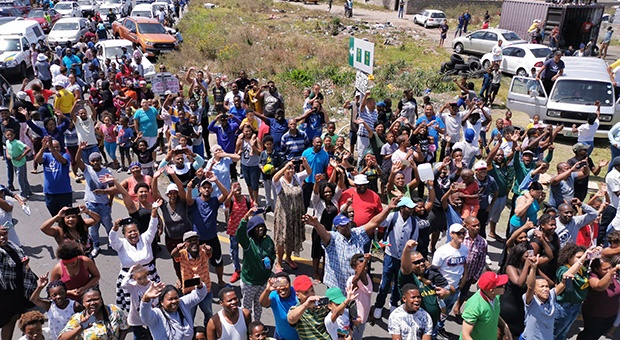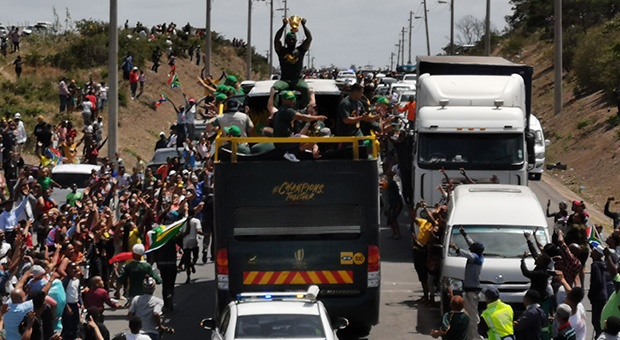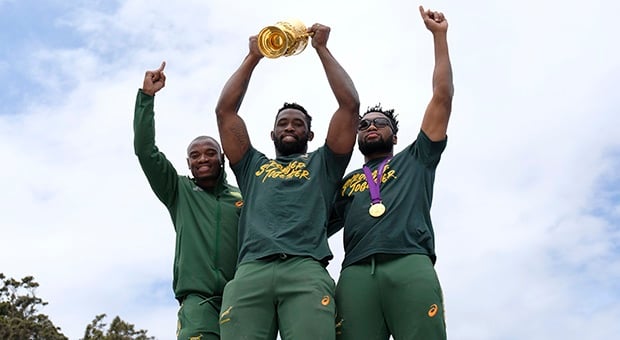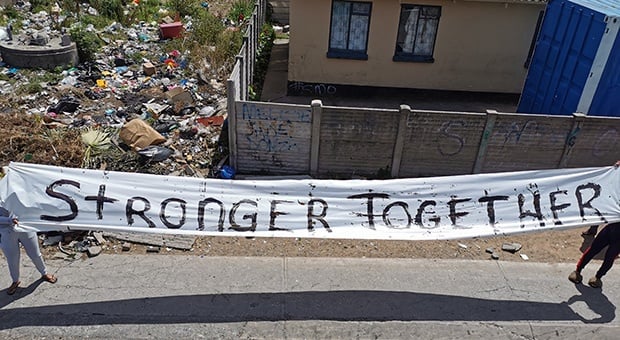East London – The Springboks jetted down in East London on Friday evening, where an intimidatingly vocal and passionate crowd had squeezed into the modestly sized airport.
The doors were shut by police at arrivals, but bodies were pressed up against the glass as hundreds of near-hysterical fans wanted to get a glimpse of their heroes.
Eventually, after an eternity of anticipation, the doors slid open as Lukhanyo Am held the Webb Ellis Cup high above his head and led the team out with the same panache he oozed in setting up Makazole Mapimpi for THAT try in the Rugby World Cup final.
It has been over a week since the Boks were crowned world champions, but the celebrations have not subsided one bit.
A rugby team's victory on the field has sparked an entire nation into life off of it, and the result is that South Africa has been winning in so many other ways.
The naysayers will remind you that the Boks winning will not solve this country's problems, but they clearly haven't seen the smiles of the masses who have packed the streets and airports of Johannesburg, Durban, East London and Port Elizabeth on the squad's trophy tour over the last few days.
The country needed this win, and the scenes of the last few days have made it so abundantly clear that South Africans, failed by their own leadership, were desperate for something to celebrate.
The tour entered a new dimension on Saturday when the Bok bus made its way through East London and into some of the more rural suburbs and townships of the Eastern Cape.
This is an area that has been identified as a potential well of black rugby talent over the years, yet the Southern Kings and Border have always struggled to be competitive on the highest stages.
When the Springboks won the Rugby World Cup in 2007, there was not a single black African in their matchday 22.
JP Pietersen and Bryan Habana were the wings in the starting line-up, but in total there were 20 white players in the squad that day.
Those kinds of numbers, combined with the fact that affluent private schools in South Africa have long been the breeding ground for future Boks, have all contributed to the stereotype that rugby in South Africa is not for everyone.
The scenes in and around East London on Saturday, though, obliterated that problematic notion once and for all.
It is exactly why this World Cup win is so significant.
Not only is Siya Kolisi the captain of the heroic class of 2019, but the try that clinched the final against England was the result of a superb piece of skill between Mapimpi and Am.
All three of those players – three of five black Africans in the starting line-up last weekend – are products of the Eastern Cape.
Am was born in King Williams Town, about 55 km inland of East London, while Mapimpi grew up in the rural township of Tsholomnqa, around 40km outside of the coastal town.
Both went via Border and the Kings en route to higher honours while Mapimpi took the long way around. It looked like his career was going nowhere as recently as four years ago when he was seemingly stuck at a financially defunct Border.
Talent, though, shone through in both instances.
On Saturday, these two heroes of the Eastern Cape were royalty and the screams and tears that followed them around their home turf were deafening at times.
There is celebration, and then there is uncontrollable delirium, and that is what Mapimpi and Am – two soft-spoken, humble men – were bombarded with for five straight hours on Saturday.
Johannesburg and Durban were chaotic legs of this trophy tour, but what happened in and around East London on Saturday was breath-taking.
"It's just crazy," Am told Sport24 at the end of a day that nobody saw coming.
"Right from this morning through to now … I can't believe it.
"Rugby here (Eastern Cape) means so much to so many people, and we saw that today."
The Bok bus started moving along the beachfront and it seemed like things would tick along smoothly, but when it entered Pefferville and then made its way through Buffalo Flats, Gompo and Scenery Park, a different type of rugby fan emerged.
By the time the bus had reached Mdantsane, the second largest township in South Africa, the power and reach of this sporting achievement presented itself in multitudes.
These were people with very little and the difficulties of their living conditions were startlingly obvious, but on this day they rejoiced.
On this day, rugby belonged to the rural communities of the Eastern Cape, because the men on that bus who had won the war for an entire nation were theirs.
The scenes that unfolded on Saturday squashed any pushbacks against transformation in this country, and they also highlighted the major problem with Test match rugby not being screened on free-to-air television.
That is something that simply must change moving forward.
It's not that these areas do not care for rugby, but perhaps more that they have not been able to relate to members of Springbok teams in years gone by.
How is a labourer or stay-at-home mother from the township, working on minimum wage or if at all, supposed to relate to a team of individuals who come from another world?
For the first time, this is a Springbok side that is beginning to represent the country that it plays for, and that is a direct result of coach Rassie Erasmus understanding the need to transform.
It is not about 'quotas', but rather about giving players equal opportunity.
Make no mistake, if Am or Mapimpi or any other player of colour in the Bok squad had played consistently poor rugby at the World Cup, they would have been dropped.
There is no room for sentiment in Test match rugby.
But, because Erasmus believed in their ability, they rose to the occasion and performed when it mattered most.
Talent cannot get you anywhere without opportunity.
From the city centre, where supporters broke through a security barrier and swarmed towards Kolisi and the bus, it was clear that East London was proud of its own.
There will be similar scenes in Port Elizabeth on Sunday, where a city opens its arms to welcome back the Springbok captain.
He remains the leader of this pack and his energy is boundless. He understands this for exactly what it is, and he will not rest until he has reached as many people as he possibly can.
As the bus made its way back towards the city after its township leg, Kolisi climbed onto its roof and launched the trophy skywards one last time.
This time, though, he invited Am and Mapimpi up there with him, and together the three danced with their community as the beautiful Eastern Cape horizon started to swallow the sun.
It was a scene as iconic as any, and one that I will remember for as long as I live.
Rugby in this country will never be the same again.
*** Lloyd Burnard is travelling with the Springboks on their 2019 World Cup trophy tour as a guest of FNB …




 Publications
Publications
 Partners
Partners
















